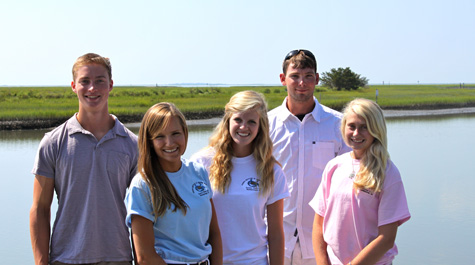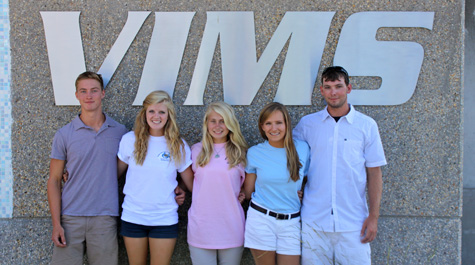Summer interns gain marine research experience at VIMS’ Eastern Shore Lab
Five high-school and college students from Virginia’s Eastern Shore had the opportunity to pursue marine science research this summer at the Virginia Institute of Marine Science’s Eastern Shore Laboratory in Wachapreague.
This year’s interns were Emilee Dize (Onancock, James Madison University); Daniel Lassiter (Onley, University of Virginia); Sarah Puchalski (Wachapreague, Nandua High School); Rachel Seaman (Painter, College of William & Mary); and Shane Taylor (Bloxom, Randolph-Macon College).
“We had a very competitive applicant pool this year and were able to take on a great group of interns,” says VIMS-ESL Acting Director P.G. Ross. “Our own research benefits from the interns helping us complete our work, and also gives them exposure to a variety of field and laboratory experiences.”
“The internship allowed me to spend the summer working on multiple research projects that required team work, communication skills, and applying the scientific method,” says Lassiter. “This experience was invaluable and has helped prepare me for future involvement in research as I pursue my graduate and post-graduate degrees.”
Seaman, a premedical student who has always been drawn to the natural sciences, says the internship combined her interests in biology and chemistry with her love of the ocean and its inhabitants. “The most important thing I learned was the need for stewardship, not only as it applies to the marine environment, but as it pertains to ourselves and the world around us. I hope that concept is something I will be able to convey to others long after the summer ends.”
The internship program, now in its 5th year, is open to college students from the Eastern Shore who are home for the summer and to high-school students 16 years of age and older. Selection criteria are highly competitive, with many more students applying than the four to five positions available. Applications are accepted beginning April 1.
Returning for her second summer as an ESL intern, Dize says, “The incredible species and the variety of people I worked with every week made my experience over-the-top. I took away loads of memories, but most of them were from talking and having fun with visiting researchers, VIMS-ESL staff, and my fellow interns.”
“The intern’s array of experience and skills made them very effective individually and as a group across the range of work needs here at the lab,” says Ross. “Much of the fieldwork was physically demanding and exposed them to mud, heat, sun, and bugs. We also gave them lots of responsibility for gathering, entering, and proofing data.”
“The internship opened my eyes to just how much time and thought goes into research,” says Lassiter. “I enjoyed nearly all aspects of the field research—from scallop sampling to shark fishing,” adds Seaman, “I always had fun out on the water.”
The intern program is entirely funded by private donations. Private donors are Marsha and Rick Amory, Cynthia Bailey, Chris and Kirkie Bosworth, Barbara and Steve Johnsen, the E. Polk Kellam Foundation, E. Polk Kellam, Jr. and Roberta Kellam, Caramine Kellam, Lucius and Tata Kellum, Debbie and Peter Lalor, Page and Tom Young, H.M. Terry Company, Inc., J.C. Walker Brothers, Inc., and Dr. Lucy Spigel Herman.
“The fact that such a privately funded program has continued since 2009 shows that folks feel like our lab and this community are worth supporting,” says Ross. “That’s certainly a good feeling for a field lab and residents of the Eastern Shore.”
VIMS’ Eastern Shore Lab is located on a 5-acre site in a facility that affords education and research opportunities not available anywhere else in the region. The lab offers the opportunity for instructors and students from VIMS, William & Mary, numerous other colleges and universities in Virginia, other states and even other countries to use the field station for classes. An important part of the Virginia Institute of Marine Science, the ESL also plays a major role in the Eastern Shore economy.
The ESL offers a variety of public-education activities throughout the year, in addition to two undergraduate field courses currently offered through VIMS’ School of Marine Science. In addition to working on research projects, the summer interns participate in some of the educational programs offered at the lab during the summer.



